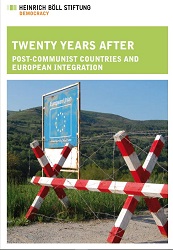TWENTY YEARS AFTER. Post-Communist Countries and European Integration
TWENTY YEARS AFTER. Post-Communist Countries and European Integration
Author(s): Ilana Bet-El, Adam Krzemiński, Jiří Pehe, Veiko Spolītis, Werner Schulz, Nicholas Whyte, Vladimir Pavićević, Tihomir Ponoš, Ugo Vlaisavljević, Fraser Cameron, Beka Natsvlishvili, Jens Siegert, Juri Durkot
Subject(s): Post-Communist Transformation, EU-Approach / EU-Accession / EU-Development
Published by: Heinrich-Böll-Stiftung e.V.
Keywords: Post-Cold War EU-Enlargement strategy;
Summary/Abstract: In the words of the Polish journalist and dissident, Adam Michnik, 1989 was Europe’s annus mirabilis. The peaceful revolution of that year was a miracle effected by the people in central and eastern Europe. Hardly any one (and certainly no western head of state or politician) had foreseen that a popular movement active in different countries would, in just a few months, topple socialist regimes and force the mighty Soviet Union to retreat behind the borders of Russia. There was Ronald Regan’s legendary call “Mr. Gorbatchev, tear down this wall!” made in June 1987 as he stood at the Berlin Wall but neither U.S. diplomats nor European governments took it seriously and some did not even want it: to them two Germanys was preferable to one.The contributors to this publication do not just look back with pleasure to those euphoric days when the people of central and eastern Europe overcame the continent’s division but they have also made sober assessments of the intervening period. What have been the results of 1989? How far have the expectations of the time been fulfilled and where have they been disappointed? What role has the example of the European Union played in the last twenty years? Where do the post-communist countries of central and eastern Europe as well as those of the Western Balkans now stand in Europe? What effect has all this had on “old Europe“, those members of the European Union whose historical experience took place on the other side of the Wall? In what way has the accession of post-communist countries influenced the European Union and its policies?
Series: HEINRICH BOELL STIFTUNG - Issue Papers
- Page Count: 129
- Publication Year: 2009
- Language: English
- Content File-PDF
- Introduction

